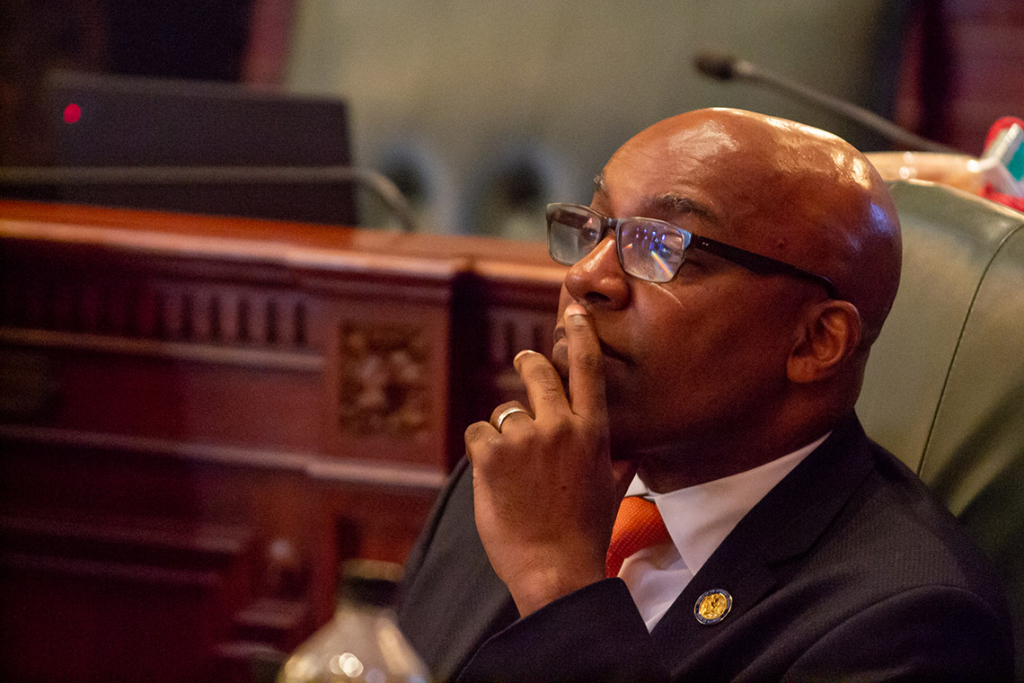
By PETER HANCOCK
Capitol News Illinois
[email protected]
SPRINGFIELD – Illinois Attorney General Kwame Raoul announced this week he has joined yet another multistate lawsuit against the Trump administration, this time over its decision to slash funding for university research grants through the National Institutes of Health.
It was at least the fourth such multistate lawsuit Raoul has joined in the three weeks since President Donald Trump was inaugurated on Jan. 20. And while Raoul admits the cost of those cases is stretching the resources of his office, he said he is not yet ready to ask lawmakers for additional funding to cover those costs.
“And the reason why I’m not going to do that is because I appreciate the place where the legislature (and) state government at large is in terms of its budget,” he said in an interview Monday, referring to a projected deficit of more than $3 billion for the upcoming fiscal year.
Instead, Raoul said, he plans to brief lawmakers on the challenges he now faces “to paint the picture for the legislature.”
Since taking office for a second term, Trump has issued a flurry of executive orders aimed at slashing federal spending, reducing the size of the federal workforce and cracking down on immigration into the United States.
Many of those actions have prompted lawsuits, particularly from Democratic-led states such as Illinois, challenging the actions as unconstitutional or beyond the scope of the president’s authority.
Since the inauguration, Raoul has joined lawsuits seeking to block the administration’s proposed freeze on federal grants and financial aid; an executive order barring the recognition of “birthright citizenship” for people born in the United States to noncitizen parents; the disclosure of private information to Trump’s newly-created Department of Government Efficiency; and, now, limitations on grant awards from the NIH.
In the NIH lawsuit, 22 state attorneys general filed suit Monday to block enforcement of a new directive that sought to cap the administrative overhead costs, known as “indirect costs,” of NIH-funded research projects at 15% of the total project cost. The move would have cost research universities in the U.S. an estimated $4 billion annually, including about $67 million annually to the University of Illinois System.
“This is an enormous and unprecedented shift, announced with no warning and with immediate effect,” Raoul said during a virtual news conference with his peers in Massachusetts and Michigan, the other lead plaintiffs in the suit.
“That is a huge blow to our universities’ ability to conduct life-saving medical research and achieve breakthrough discoveries that make life better for all of us,” he said. “The impact of the change would be enormous in Illinois and to the country at large.”
A federal judge in Boston quickly put a temporary hold on the order pending further proceedings. A hearing in the case is set for Feb. 21.
In addition to those cases, Raoul’s office is defending the state, along with Chicago and Cook County, against a Department of Justice lawsuit challenging state and local laws that limit local law enforcement cooperation with federal civil immigration enforcement actions.
And, while not joining the case as a party, his office filed a friend-of-the-court brief in a lawsuit by 20 other state attorneys general challenging the administration’s federal “buyout” plan that seeks to eliminate the jobs of tens of thousands of federal workers.
In an interview with Capitol News Illinois, Raoul said the volume of litigation has become so intense, he would like to add new attorneys who would focus solely on litigation battling the Trump administration.
“The role of state attorneys general has expanded from what it used to be. It has happened on both sides of the aisle,” Raoul said. “There’s been more involvement of state attorneys general, like during the Obama administration. Republican state attorneys general were very active trying to respond to the administration’s executive orders and suing over the Affordable Care Act and numerous other things. So during Trump’s first term, likewise, Democrat attorneys general were involved in trying to protect against federal executive branch overreach.”
Raoul noted that his office’s budget has grown since he was first elected attorney general in 2018. According to the Commission on Government Forecasting and Accountability, it has more than doubled in six years to just under $194 million in the current fiscal year.
“When I took over as attorney general, we had the worst attrition rate in the country,” Raoul said. “We were in essence training lawyers to go work elsewhere. They’d come here, work for three or four years, learn their practice, and go work elsewhere because we couldn’t pay them as much. And so we’ve turned this corner on that.”
But it remains unclear how receptive lawmakers or Gov. JB Pritzker would be to a request for a budget increase solely for funding litigation against the Trump administration considering the projected deficit.
In a statement Tuesday, Pritzker said he fully supports Raoul’s legal efforts so far, including the suit challenging NIH funding caps, saying it was “important and necessary to stop Trump’s increasingly authoritarian executive orders.”
Pritzker is scheduled to deliver his budget address to the General Assembly on Wednesday, Feb. 19.
Capitol News Illinois is a nonprofit, nonpartisan news service that distributes state government coverage to hundreds of news outlets statewide. It is funded primarily by the Illinois Press Foundation and the Robert R. McCormick Foundation.






